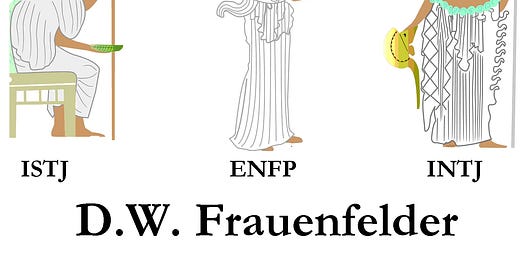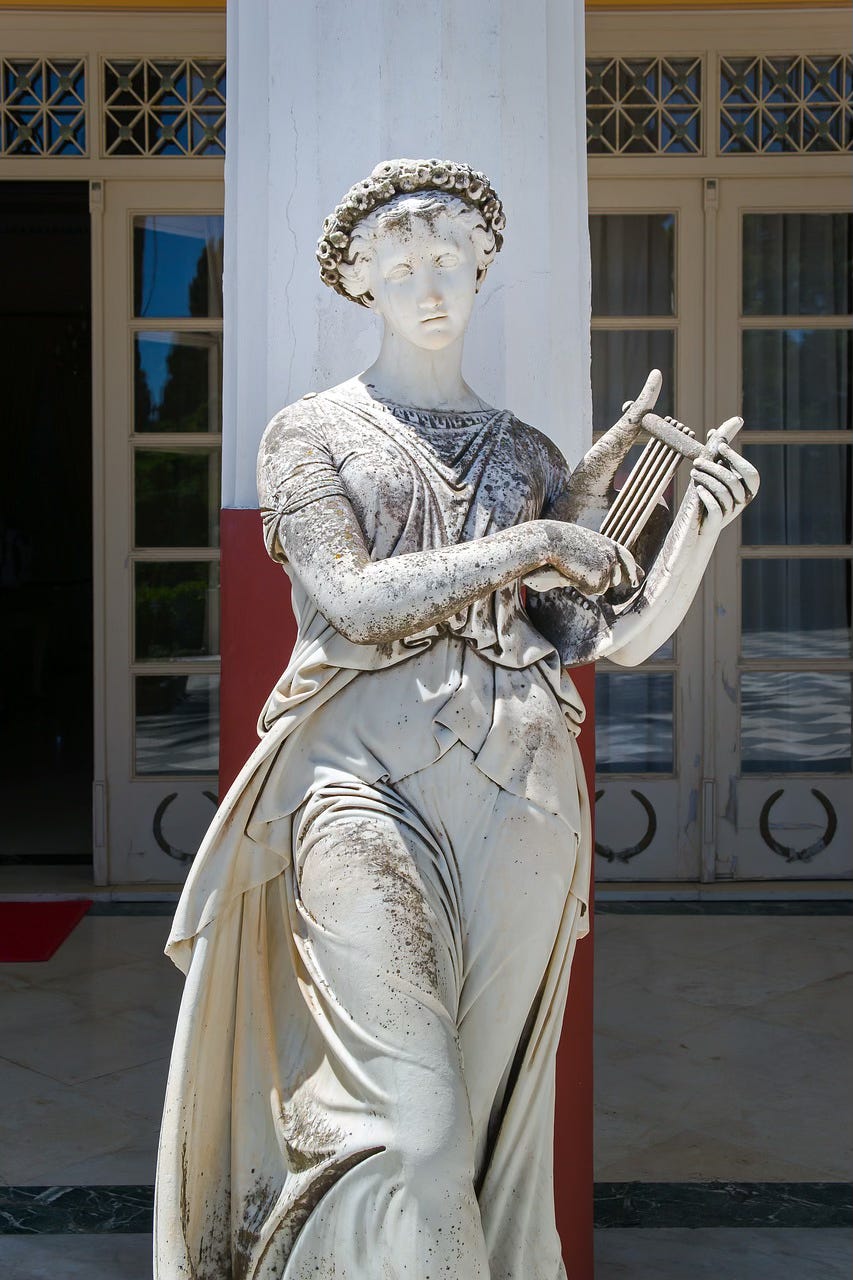Is Zeus your type?
If you know Greek mythology, you’re probably thinking, “Zeus didn’t have a type. He liked all the types.”
But we’re not talking about dating.
We’re talking about The Myers-Briggs Type Indicator (MBTI for short), a personality typing system based on Jungian psychology that many folks either love or hate.
In the hate category: I was reading David Brooks’s book How to Know a Person, where he rants about how MBTI isn’t any good for typing people, and how something called “The Big Five” is better.
I don’t know what is better or worse. But I like MBTI enough that I wrote a book called Zeus Is My Type, in which I assign a MBTI type to 16 of the most popular Greek gods and goddesses, and I explain why they line up with that profile.
And the reason why I like MBTI is because it works for me.
In other words, it’s useful.
I haven’t come across any other personality system that is as useful for understanding why people are the way they are, and what I need to do to get along with them.
That may be because MBTI was created by a person (Isabel Briggs Myers) whose personality type was similar to mine (INFP), and who was interested in dealing with life by figuring out how to be in harmony with other people.
For an INFP like me who is extremely interested in harmony and not at all interested in strife, disagreement, rancor, and hard feelings, MBTI is hard to beat as a diagnostic tool for dealing with human beings.
And, truth be known, it explains a lot about Greek mythology, too.
Turns out, however, that I am not the first to that party.
Warning: Geeky MBTI personality and Greek mythology stuff for the rest of this post. Interested in MBTI but don’t know a lot about it? Try here.
A pretty long time ago (1978), there came into the world a best-selling book called Please Understand Me that used Greek divinities as markers for four main MBTI groups.
According to authors David Keirsey and Marilyn Bates (who came to be known as Keirsey-Bates), the 16 personality types can be divided into four main categories.
The “Artisans” (the SPs) are called Dionysian, while the SJs are called “Guardians” and are Epimethean (after Epimetheus, the brother of Prometheus). The NTs are the “Rationals” and are Promethean, and finally, the “idealist” NF types are called Apollonian.
I find these mythological monikers to be not to my taste at all, based on the original, ancient stories in which these divinities appear.
In short, these gods’ personalities don’t match with their categories.
Though Dionysus is an SP (a party-animal ESFP, to be exact), he is not an artisan in any sense of the word. He is a disruptor and agent of chaos; at best, Dionysus is a celebrator and person who helps by shaking up society when it has become too restrictive. Hephaestus (an INFP in my opinion) would be closest to being an artisan, if you’re going to have artisans in your personality system.
Epimetheus has very little personality at all. In fact, he is ridiculed by his name (Epimetheus means “Afterthought”) because his major act in Greek mythology is to bring the disastrous Pandora into his household so she can open the jar of evils and bring suffering to mankind, even after Prometheus warns him not to. He is certainly not a guardian.
Prometheus, similarly, is not a primarily logical or rational being. Though his name means “Forethought,” which implies that he thinks things through before acting, his major act in Greek mythology is to defy Zeus, the “father of gods and men,” by stealing fire from him to give to humans for their benefit. Prometheus is more like a protest-minded ENFJ who wants to make the world better by speaking truth to power. If you want to see an ENFJ in action, read the Greek drama Prometheus Bound, where the chained Prometheus explains his reasons for defying the tyrant Zeus and laments the punishment meted out to him.
Apollo is also miscast as an NF type. He is the classic INTP, the tone-deaf logic lover who has intellectual gifts in abundance but lacks the feeling radar that is the strength of NFs. There is a poem by (the brilliant Macarthur grant-receiving) A.E. Stallings that sums up Apollo’s personality perfectly, called “Apollo Takes Charge of His Muses,” in which he explains that hereafter the Muses will report to him when it comes to matters of inspiration. The poem is in the voice of a Muse, who reports that
Apollo…
…looked forward
To working with us. Wouldn’t it be fun? Happy
To answer any questions. Any questions? But
None of us spoke or raised her hand, and questions
There were none; what has poetry to do with reason
Or the sun?
This is so devastatingly accurate. Apollo’s disastrous love affairs, none of which come out with any kind of success, is a great example of how his thinking mind handicaps his feeling.
For me, if I were to make four categories of types, I would go with SFs, STs, NFs, and NTs.
SFs: Demeter (ESFJ), Dionysus (ESFP), Artemis (ISFP), and Hestia (ISFJ). These are the Helpers.
STs: Poseidon (ESTP), Hades (ESTJ), Hera (ISTJ), Ares (ISTP). These are the Guardians.
NTs: Apollo (INTP), Athena (INTJ), Hermes (ENTP), Zeus (ENTJ). These are the Rationals.
NFs: Hephaestus (INFP), Persephone (INFJ), Prometheus (ENFJ), Aphrodite (ENFP). These are the Idealists.
Notice that with the exception of Prometheus, all these gods and goddesses are Olympian in some way. The popular idea is that there were 12 Olympians, but depending on how you count, there are as many as 17.
But anyway, for me, the guy who wants to know what makes people tick so that I can maintain harmony with them, this grouping makes a lot of sense.
As a teacher, I work with a large number of SFs. These are the people who are absolutely interested in helping.
The ISFJ is the purest of the helpers and often the best K-12 teaching type, and Hestia is all about sitting at the hearth fire of the home and providing stability. ESFJs can be control freaks (“Where is my daughter? I’ll do whatever it takes to get her back!” - Demeter), but they also do a huge amount of good in needed places. Partier Dionysus also helps in giving a safety valve for civilization where all work and no play makes for a bad civilization. And Artemis? She’s your environmentalist, quietly working behind the scenes to make sure the biosphere is preserved.
The STs can also be very helpful types, but with a different modus operandi.
Hera, Poseidon, and Hades all guard stuff in the Ancient Greek world: Hera and Hades are guardians of marrying and burying, while Ares and Poseidon are types who point to the uncontrollable violence of both people and nature, and the need to respect that wildness. There’s a threat in these types that’s more upfront than in the SFs, but despite that they are quite useful to humans.
Generally, it’s the NTs that don’t like MBTI, and that’s because they don’t care about understanding others and being in harmony with them.
Zeus is the classic CEO “Sorry you had to die” ENTJ type. He’s refreshingly transparent in his actions, but don’t expect to be coddled or mentored or (gasp) loved. Hermes is a silver-tongued trickster and it’s never personal when he messes with you, as Apollo found out. The INTP is closest of all these to being a feeling type, but it’s buried under a lot of logic and hard mental boundaries.
Athena? I’ve always liked INTJs. They calmly believe they know everything, especially how to make the whole world a better place, and Athena at least has the virtue of taking heroes under her wing with her superior knowledge. Just don’t fail to live up to her expectations.
Finally, we have the wonderful, soft-skilled, often neurotic NF types.
Aphrodite is the charismatic ENFP social butterfly, unhappily married to the solitary creative INFP Hephaestus. Is it any surprise that Persephone also is mismatched with Hades, but makes the best of it as Queen of the Underworld and deep diver into the underworld, AKA the metaphorical subconscious? And Prometheus, a huge idealist, seeker of justice, advocate for humans, doesn’t make his life any easier by pointing out to the inflexible ENTJ Zeus that maybe, just maybe, Zeus’s executive style is closer to tyrant than benevolent dictator.
All of which, reader who has done me the kindness of reading this far, should be taken with a very large grain or two of salt—not only because of David Brooks (an NT if there ever was one), but because I am not a psychologist, only a country mythology teacher.
(It’s ironic that Brooks wrote a book called How To Know a Person, as if he was the first person ever to write a book like that. It’s almost as if it didn’t occur to him that there are some people for whom knowing a person is a daily obsession. But maybe for those who don’t spend their time—like I do—obsessing on what makes others tick that he wrote this book.)
(Also, the title is somewhat misleading. The book is as much a memoir as it is self-help—maybe more.)





Without first going down the MBTI rabbit hole in 2015-6, I don't know if my understanding of astrology would have been so accessible in 2019, so I'll always be grateful to MBTI for opening that world for me. Basically, MBTI has a connection to astrology, notably in how the four elements---Fire (Intuition), Earth (Sensing), Air (Thinking) and Water (Feeling)---line up.
I do agree with some who say because MBTI results are usually drawn from self-testing (as opposed to a person's natal chart, which is just there for anyone to read and interpret), they should be taken with a grain of salt. However, if one has done enough personal growth and is interested in these topics, I think that if you take the test several times over a period of a year or two (or more), you'll likely land on the same result---at least most of the time.
On my end, that type is an ENFP and only once did I test as an INFP and, as I joke with my INFP friends, that was a time when I was depressed! Ha ha, just kiddin' INFPs, y'all are my favorites!
And last, I like your breakdown of these Greek characters into these types. I'm not as familiar with their stories as you seem to be, but from what I know, your categories make much more sense than the other one you shared.
I agree with your somewhat qualified appreciation of thr Meyers-Briggs system. I have found it useful both in premaritial counseling and in working g with vestries. But I do recognize the critique of those who argue it may be somewhat pseudoscientific. Like you, though, I use it not to diagnose medically but as a rather fuzzy to for day-to-day practical matters. And for that, I do think it's useful.
By the way, my wife and I are also both INFPs. My understanding is that it's the most common type for clergy, despite being a smaller group in the general population.